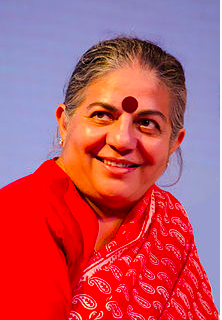This restriction on their profits did not sit well with Monsanto, which then challenged the Andhra Pradesh Cotton Seeds Act. The Research Foundation for Science Technology and Ecology had to intervene in the case once more, which is still before the Andhra Pradesh High Court.
While Monsanto does not have a patent on Bt cotton in India, it goes outside the law to collect royalties as "technology fees". Most of the 300,000 farmers suicides in India since 1995 (when the WTO came into force) are concentrated in the cotton belt. And 95 percent of the cotton in India is controlled by Monsanto.
Out of India's 29 states, those with Bt Cotton have the highest suicide rates.
Correlation is the first step to understanding causation. Monsanto does not see the above correlation because the next logical step would be to plead guilty for the deaths of all the farmers whose lives have been reduced to numbers on a table, or a bank account in St Louis.
Additionally, Monsanto knows that Bt Cotton is dependent on irrigation. Despite this knowledge, Monsanto has pushed its Bt Cotton into regions that depend solely on rainfall, as opposed to irrigation. These include Vidarbha in Maharashtra, where most cotton farms are less than 1 hectare and are dependent solely on rainfall. The costs of Bt cottonseed and insecticide increase the risk of farmer bankruptcy in low-yield rainfed cotton. The criminal negligence of knowingly setting up marginal farmers--who can't afford to irrigate and whose options for obtaining seeds have been acquired by Monsanto--for dire failure, cannot be ignored.
A recent research paper published by Environmental Sciences Europe concluded:
"[THE] INABILITY TO USE SAVED SEED AND INADEQUATE AGRONOMIC INFORMATION TRAP COTTON FARMERS ON BIOTECHNOLOGY AND INSECTICIDE TREADMILLS. ANNUAL SUICIDE RATES IN RAINFED AREAS ARE INVERSELY RELATED TO FARM SIZE AND YIELD, AND DIRECTLY RELATED TO INCREASES IN BT COTTON ADOPTION (I.E., COSTS). HIGH-DENSITY SHORT-SEASON COTTONS COULD INCREASE YIELDS AND REDUCE INPUT COSTS IN IRRIGATED AND RAINFED COTTON. POLICY MAKERS NEED HOLISTIC ANALYSIS BEFORE NEW TECHNOLOGIES ARE IMPLEMENTED IN AGRICULTURAL DEVELOPMENT."
"Fourteen years after U.S. multinational Monsanto brought the genetically modified (GM) Bt Cotton (Bollgard) to India, there is no clarity on the discovery having ever been patented in the country," states a recent Times of India article. India does not recognize patents on life, including seeds. The royalties Monsanto has collected over the last 14 years are based on a patent that does not exist and is therefore, quite simply, theft. Monsanto is robbing the people who have the least, of the very last thing they can give--their lives.
Illegal patents on life through Monsanto's laws in the WTO
In 1980 the U.S. Supreme Court heard a case that is now famous for being the point in world history where life forms were first allowed to be patented--not only in the US, but through the WTO, in many other parts of the world. Ananda Mohan Chakrabarty, a General Electric employee, had applied for a patent for a process of producing a bacterium capable of eating crude oil spills and on the bacteria itself. The claim was rejected by the U.S. Patent office, but on appeal, was granted by a 5-4 majority in the Supreme Court.
"The decision of the Supreme Court in Diamond v. Chakrabarty, 447 U.S. 303, 206 USPQ 193 (1980), held that microorganisms produced by genetic engineering are not excluded from patent protection by 35 U.S.C. 101"
4. "This is not to suggest that 101 has no limits or that it embraces every discovery. The laws of nature, physical phenomena, and abstract ideas have been held not patentable."
5. "Thus, a new mineral discovered in the earth or a new plant found in the wild is not patentable subject matter. Likewise, Einstein could not patent his celebrated law that E=mc2; nor could Newton have patented the law of gravity."
Source: http://www.uspto.gov/web/offices/pac/mpep/s2105.html
Genetic engineering has not been able to deliver on its promises--it is just a tool of ownership. Bt Cotton is not resistant to Bollworm, RoundUp Resistant varieties have only given rise to super weeds and the new promises being made by biotech corporations of bio-fortification are laughable. There is no benefit to things like Golden Rice. By adding one new gene to the cell of a plant, corporations claimed they had invented and created the seed, the plant, and all future seeds, which were now their property. Monsanto does not care if your cotton field has Bollworm infestations, just so long as the crop can be identified as theirs and royalty payments keep flowing in. This is why the failure of Bt Cotton as a reflection of bad science does not bother them--the cash is still coming into St Louis. At its core, genetic modification is about ownership.
In 1981, shortly after the precedence of life forms being patented had been set in the U.S., Monsanto, which was a chemical company at the time, decided--as it lays out on it's own website--that biotechnology would be its strategic research focus in the future. Selling chemicals requires raw materials that eat into profit. Intellectual Property, on the other hand, just pays. In the decade and a half since 1981, with this new "strategic research focus" and all the R&D dollars you can imagine, Monsanto has only been able to produce failures--failures that pay royalties from all across the world.
Monsanto saw that by claiming ownership of life forms, especially seed--the first step in the food chain--and destroying alternatives or making them illegal, would allow them to charge royalties for the source of food, fibre and fuel. It was easy money and a lot of it. The limited achievements of Monsanto's research focus have not given us better cotton, corn, canola or soya--they've merely made it all theirs.
Next Page 1 | 2 | 3 | 4 | 5 | 6 | 7 | 8
(Note: You can view every article as one long page if you sign up as an Advocate Member, or higher).





